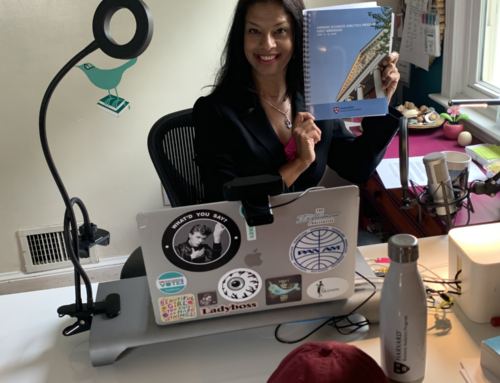 One of the great things about joining a professional development organization is that you can get hands-on leadership experience as a volunteer; experience which, they say, will serve you well in your “real” job. Certainly that’s a selling point for such organizations and in the PR/communications field, organizations such as IABC and PRSA thrive on it.
One of the great things about joining a professional development organization is that you can get hands-on leadership experience as a volunteer; experience which, they say, will serve you well in your “real” job. Certainly that’s a selling point for such organizations and in the PR/communications field, organizations such as IABC and PRSA thrive on it.
What kind of leadership skills do volunteer leaders actually gain though? And do these skills actually benefit them in their careers, or are they simply good volunteer leaders because of skills they’ve acquired through their day jobs?
At the end of the day, is being a volunteer leader””with all the time it takes””worth it?
I recently started my term as President of IABC/Washington after having previously served on the chapter board as VP, Professional Development, for three years until a couple of years ago. Before moving to the DC area, I served on the board of San Francisco Bay Area Publicity Club and now, in addition to my duties at IABC/Washington, I volunteer on IABC International’s Accreditation Council.
Lessons in leadership
Here are three leadership lessons I continue to learn that have been assets in my own business:
1. “Decision by committee” and “democracy” are two different things.
I’m all for healthy debate and respectful disagreement. Heck, that’s why we have boards””to discuss and debate the pros and cons of decisions that will affect chapter members as a whole and, possibly, be held up by other chapters as precedents or best (or worst) practices.
But if you’re in a leadership position such as president, you’ve got to know when to close that debate and make a decision.
It’s ok if all decisions are not unanimous. That’s why boards have quorum requirements. What’s not ok is to drag on the debate until you’ve practically twisted everyone’s arm to agree with your viewpoint.
Debate the heck out of the issue, get the majority vote, make the decision (setting your ego aside, if you have to) and move on.
2. Boundaries don’t just work, they’re necessary.
It’s easy, as a volunteer, to get sucked into doing things that other board members should be doing, but aren’t, or delay on…because you’re passionate about the organization you’re volunteering with, and want to succeed. “If so-and-so can’t do it, or doesn’t do it, I’ll just do it myself.” That’s all well and good, but you’ll get very tired being Superwoman after a while.
Successful delegation is a critical aspect of successful leadership, management and growth. If you don’t learn to set boundaries on your time and activities, you’ll constantly be at the receiving end of unrealistic expectations and will burn out. So be clear about what you expect and when you expect it, and then””and this is the tough part””let your team work its way through its collective charge. You can’t do everything for everyone all the time and if you do, it’s an indication that your team has some serious weaknesses.
3. Setting benchmarks and measures of success is critical.
I write (you may have to log in to read this op-ed I wrote in PRWeek earlier this year) and present often on measurement in public relations, because that’s my field.
But measurement itself is intrinsic to the success or failure of a business””and it should be at a volunteer level as well.
Passion, by itself, does not make for success. By definition, success implies meeting or exceeding stated goals and objectives. Which means we’ve got to start at the end””what do we want to achieve? Put it in writing, and working towards it will be so much easier. And if you don’t meet your goals, there’s no shame in that. But tracking your progress will at least show you what’s working and what’s not. And when it’s time to pass the torch, the new set of volunteer leaders will be grateful for the lessons you can pass on to them.
It’s quite a ride, this volunteer thing.
It’s exhausting, energizing and exhilarating all at the same time (and I’m sure you could come up with a few choice words yourself). And it’s the very best thing I could have done for myself to grow not just in my profession, but as a leader, manager and now, business owner.
I very much hope it is for you too, and I would love to know what lessons in leadership your volunteerism have taught you.
Would you continue the conversation by leaving a comment so that we can all learn from each other?
This post – with a very few minor differences – is featured today as a guest post on Women Grow Business. Many thanks to Jill Foster for allowing me to cross-post here. And this great image, called “Out in Front,” is from monkeyleader’s Flickrstream (also found by the redoutable Jill).







[…] As I wrote at the end of 2009, being a volunteer leader is a great way to hone your skills for your “real” job. […]
Can’t say enough about how this is resonating with me as I begin my term as 2010 president of the PRSA National Capital Chapter.
The leadership benefits you mentioned are just part of the benefits I’ve received from being involved with PRSA-NCC. Simply put, being involved allows me to maximize the benefits that I would normally get as a member.
I’ve worked in small nonprofit/association PR environments for the last 10 years so being able to connect with other PR people is valuable on many levels for me. There’s professional development–not just PR knowhow but also managing people, budgets, meetings, etc.. Also, there are speaking opps, the chance to network with service providers and potential hires or employers, increasing my professional profile in the DC PR community, etc.
But back to involvement….here’s how I get some people to get involved. I tell them to think of their involvement as part of their job, not some albatross. I ask them to simply integrate it into their work day. Even people with billable demands can do this if they simply add time at the beginning/end of the day, during lunch, etc.
Thanks for your insight, Jeff. I like how you frame the concept of involvement as part of one’s job. I think a lot of people feel if they’re not getting paid for it, it doesn’t count. But our experiences – and those of so many more – show that it does. It’s how you make it count, isn’t it?
Shonali, I’ve been in IABC for (gasp) almost 20 years, and have never gotten as much out of my membership as when I’ve been in leadership. Just as you, I joined the board of IABC Cleveland and became chapter president. I rejoined the chapter board this year, and served as sponsorships co-chair for the Heritage Region conference, just held in October here in the Green City by the Blue Lake.
As an entrepreneur, my IABC involvement this year has been critical for simple awareness. But I’ve also gotten the chance to show people what I can do — something much more important than simple networking.
I’m also very active in the Institute for PR, as a member of the Commission on Measurement and Evaluation. That, too, has given me a profile impossible to attain without active involvement, as an editor of papers, and an author of them. I nabbed a byline story in PR News because of that involvement.
The meta story for me is that engagement isn’t a buzzword, it’s a strategy. Involvement is evidence that it works.
Sean, you’re an IABC pillar! Thank you so much for sharing your experience. I’m looking forward to finally meeting you in Cleveland next year.
Shonali,
IABC Cleveland is excited to be hosting you in March 2010!
I serve as IAC Cleveland president and am fortunate to work alongside a talented group of people, among them Sean Williams. My volunteerism contributes to skills that I need professionally and personally. I’ve gained management, HR and finance skills. My teenagers see my volunteer activities (IABC and service-based) and are realizing they must (to paraphrase) be the change they wish to see in the world.
What a great way to put it, Kavita, thank you.